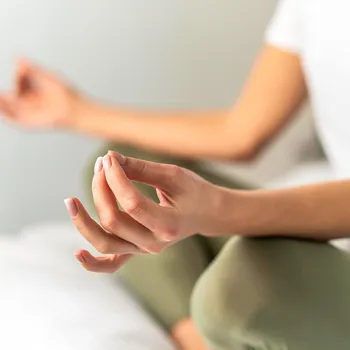Discover the transformative power of mindfulness on health and well-being. Dive into 8 ways it can change your life!
In today’s fast-paced world, where deadlines loom and stress seems to be a constant companion,
finding moments of peace can feel like a distant dream. But what if I told you that the key to unlocking inner calm and better health lies within you?

Enter mindfulness, a simple yet powerful practice that’s gaining popularity for its ability to transform our lives. Mindfulness is all about paying attention to the present moment, without judgment.
It's about noticing your thoughts, feelings, and sensations as they arise, without getting carried away by them. Think of it as observing a river flowing by – you see the leaves and twigs floating on the surface, but you don't jump in and get swept away.
It is about making a conscious choice to be present in each and every moment.
Mindfulness isn’t some new-age fad; it's rooted in ancient traditions and is now backed by scientific research. Studies have shown that mindfulness can have a profound impact on our physical and mental health.
It’s a versatile tool that can be incorporated into our daily routines, whether it’s through formal meditation, mindful breathing exercises, or simply paying attention to the taste of our food. The beauty is, mindfulness is accessible to everyone, regardless of age, background, or belief system.
It's a skill that can be cultivated and honed over time, leading to significant improvements in our overall well-being. Many incorporate it from early childhood, as it helps children perform better in academics and helps them focus in activities.
Here are 8 ways mindfulness can transform your health and well-being:
Reduces Stress and Anxiety: Let's face it, stress is practically a national pastime. But chronic stress can wreak havoc on our bodies and minds, leading to a host of health problems. Mindfulness helps us to become more aware of our stress triggers and develop coping mechanisms. When we practice mindfulness, we learn to observe our thoughts and feelings without judgment, which allows us to disengage from negative thought patterns and reduce anxiety. Through regular meditation, it lowers cortisol hormone, which is a major cause of stress. This helps us to be calm even in difficult situations.
How to Incorporate: Start with just 5 minutes of mindful breathing each day. Find a quiet place, close your eyes, and focus on your breath as it enters and leaves your body. When your mind wanders, gently guide it back to your breath.

This simple exercise can help calm your nervous system and reduce feelings of stress and anxiety. Also, incorporate mindful breaks during work to calm yourself, and allow yourself to do better in every activity.
Improves Focus and Concentration: In this age of constant distractions, it's easy to feel like our attention spans are shrinking. Mindfulness can help us to train our minds to focus and concentrate better. By practicing mindfulness, we learn to be more present in the moment, reducing mental clutter and improving our ability to focus on the task at hand. It acts as a gym for your brain. Just how exercise increase fitness, it improves your focus and concentration.
How to Incorporate: Try mindful observation. Choose an object, like a flower or a piece of art, and focus all your attention on it. Notice its colors, textures, and shapes. When your mind wanders, gently bring it back to the object.

This exercise can help you to train your mind to focus and concentrate. Also, try doing this while studying or focusing on work, this will significantly help your work output.
Boosts Emotional Regulation: Mindfulness can help us to become more aware of our emotions and develop healthier ways of responding to them. By observing our emotions without judgment, we can learn to manage them more effectively, reducing emotional reactivity and increasing emotional resilience. This allows us to respond to situations with greater clarity and composure. It gives us time to analyse the situation, and then react accordingly. This is a great ability to adapt in any situation.
How to Incorporate: Practice mindful emotion tracking. Throughout the day, take a moment to check in with yourself and notice what emotions you are experiencing. Simply acknowledge them without judgment, and observe how they feel in your body.

This practice can help you to become more aware of your emotional patterns and develop healthier ways of coping with them. Try journaling, where you can write down your emotions and read them out loud.
Enhances Sleep quality: Are you tossing and turning at night, unable to quiet your racing thoughts? Mindfulness can help you to relax and unwind before bed, promoting restful sleep. By practicing mindfulness, we can reduce mental chatter and create a sense of calmness that prepares us for sleep. This helps us to fall asleep faster and stay asleep longer.
How to Incorporate: Engage in guided meditation before bed. There are many apps and online resources that offer guided meditations for sleep. These meditations can help you to relax your body and mind, preparing you for a good night’s sleep.

Try reading a book or relaxing without your phone, as the blue light may disrupt the quality of your sleep.
Promotes Self-Awareness: Mindfulness can help us to gain a deeper understanding of ourselves, our thoughts, feelings, and motivations. By observing ourselves without judgment, we can identify patterns of behavior and thought that may be holding us back. This increased self-awareness can empower us to make positive changes in our lives and live more authentically. With increased self awarness, we can figure out what we want to do moving forward.
How to Incorporate: Practice mindful self-reflection. Take some time each day to reflect on your experiences, paying attention to your thoughts, feelings, and reactions. Ask yourself questions like, "What am I grateful for today?" or "What did I learn from this experience?

" This practice can help you to gain a deeper understanding of yourself. Practice gratitude and have a glass half full perspective always.
Fosters Compassion and Kindness: Mindfulness can cultivate feelings of compassion and kindness, both towards ourselves and others. By practicing mindfulness, we can develop a greater sense of empathy and understanding for the struggles of others. This can lead to more compassionate and supportive relationships. A great sense of peace can be achieved by being peaceful to others and being kind in general.
How to Incorporate: Engage in loving-kindness meditation. This meditation involves focusing on feelings of love and kindness, first towards yourself, then towards loved ones, then towards neutral people, and finally towards all beings.

This practice can help you to cultivate feelings of compassion and kindness. Helping other, even little acts of kindness goes a long way.
Manages Pain: Chronic pain can be debilitating, impacting every aspect of our lives. Mindfulness can help us to manage pain by changing our relationship to it. By observing our pain without judgment, we can reduce our resistance to it and learn to cope with it more effectively. This can lead to a reduction in pain intensity and improved quality of life. Try yoga asanas, as they also bring better quality to your health.
How to Incorporate: Practice mindful pain awareness. When you are experiencing pain, take a moment to focus on the sensations in your body. Notice the intensity, location, and quality of the pain. Simply observe the pain without judgment, and resist the urge to fight it or resist it.
This practice can help you to reduce your resistance to pain and cope with it more effectively. Consult your doctor to explore further options to deal with the pain.
Improves Relationships: Mindfulness can enhance our relationships by increasing our awareness of our own thoughts, feelings, and behaviors, as well as those of others. By being more present and attentive in our interactions, we can communicate more effectively, resolve conflicts more constructively, and build stronger, more meaningful relationships. This has an overall better experience on our and our loved ones life.
How to Incorporate: Practice mindful listening. When someone is speaking to you, focus all your attention on them. Make eye contact, listen attentively to their words, and resist the urge to interrupt or judge. This practice can help you to become a better listener and build stronger relationships.
Try communicating your problems in a calm way without judging, to improve your relationships.
Mindfulness is a powerful tool that can transform your health and well-being in profound ways.
By incorporating mindfulness into your daily life, you can reduce stress, improve focus, boost emotional regulation, enhance sleep quality, promote self-awareness, foster compassion, manage pain, and improve relationships.
So, take a deep breath, embrace the present moment, and discover the power of mindfulness. Start small and celebrate progress. Mindfulness is a journey, not a destination.
AI Generated Content. Glance/InMobi shall have no liability for the content














